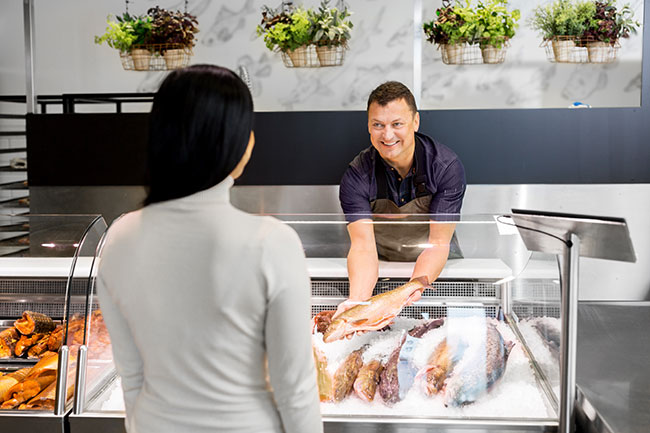
Opinion
News
Sustainability
KM zero
Is local, same-day delivery becoming a reality for fish producers?
November 5, 2020 By Maddi Badiola
 Locally produced seafood is gaining traction in supermarket shelves. (Photo: AdobeStock)
Locally produced seafood is gaining traction in supermarket shelves. (Photo: AdobeStock) The world has changed. The year 2020 was supposed to be an incredible year, everyone had high expectations. But no one expected the ongoing sequence of events. Who imagined that we would be living this global pandemic?
Here, in the Basque Country in Spain – where being outside is our way of living, surrounded by family and friends, eating and drinking, socializing – it is hard to believe that our culture and our way of life would need to be modified. Did anyone ever imagine we would be drinking wine with a mask on or those “pintxos” (i.e. “tapas” in Basque) being covered by plastic wrapping?
Nevertheless, from something bad there is always something positive that can emerge. In this regard, as a result of COVID-19, much of the human way of food consumption has changed – or reverted back – towards local production. And this is a good news.
Aquaculture and the environment
Global aquaculture makes an important contribution to food security directly (by increasing food availability and accessibility) and indirectly (as a driver of economic development). But how does it contribute to global greenhouse gas (GHG) emissions? How can this be mitigated?
Climate change and global warming, directly related to greenhouse emissions, are two of the biggest threats recognized by environmentalists, and by people looking for a sustainable lifestyle.
Clouds, water vapor, carbon dioxide and other atmospheric gases retain heat radiated by the earth. Excessive or elevated GHG will cause the planet’s temperature to increase. Such intensification, which happens naturally, is exacerbated by increases in concentrations of greenhouse gases in the atmosphere from air pollution – especially from combustion of fossil fuels.
Carbon dioxide is the major greenhouse gas resulting from human activities and as such, the efforts to lessen carbon emissions through energy conservation, greater use of fossil fuels with lower carbon emissions, switching from fossil fuels to biofuels and development of alternative (i.e. solar, wind and water) energy resources are some of the initiatives that governments, companies and individuals are undertaking.
And what about transportation? It is relatively easy to put some solar panels on the roof of a company building. However, this does not make any sense if the product produced is going to travel halfway (or more) across the planet to reach its target market. In 2008, the Food and Agriculture Organization (FAO) published a report to end energy use in the world food system, citing processing and distribution account for greater energy use among plant crops, livestock, fisheries and aquaculture, retail, preparation and cooking.
The question is: should we produce food closer to the market? The term “KM zero” or zero kilometre – referring to food produced near the consumers’ place of residence or at a maximum distance of 100km from it, to preserve freshness and quality – has been gaining market traction among more concious consumers. More and more companies are looking for products delivered on a daily basis. As such, some of the biggest and most important fish producers in the world are looking to add daily-delivered, fresh-farmed salmon to their product portfolio.
Aquaculture accounted for approximately 0.45 percent of global anthropogenic GHG emissions in 2013. This is similar in magnitude to the emissions from sheep production. However, such modest emissions reflect the low emissions intensity of aquaculture due largely to the absence of methane production, high fecundity and low feed conversion ratios of finfish and shellfish.
But aquaculture production is increasing rapidly, and emissions arising from post-farm activities (e.g. transportation, which is not included in the 0.45 percent calculation) could increase significantly with the emissions intensity of some supply chains.
A potential solution to solve such concerns has a name, and it is recirculating aquaculture system (RAS): fish farming free of pollutants, antibiotics and disease, located near the markets.
Biosecurity, low GHG
RAS can be located anywhere and requires less land/space than any other aquaculture system. This is advantageous for the producer, providing them close proximity to the market or suppliers. This also translates to reduced CO2 footprint and transportation costs.
Would consumers want their product harvested on, say Monday, and be in their fridge by Friday? Or do they want to have fresh fish delivered to their homes? Maybe those two examples are the most extreme but both are possible. Consumers, as key players and the final link in the supply chain, need to choose. While portions of the world have been locked down, food producers have been working harder than ever and have become innovative in the way they deliver their products. I know of one company delivering RAS-farmed pompano directly to homes and restaurants, and the acceptance from the consumers has been very positive. With such in-person delivery, these customers got to know and trust the supplier, and in the end that is what we are looking for.
Locally produced, KM zero products are gaining space in supermarket shelves. Locally produced, daily delivered fish, may have previously been a luxury, but it’s possible to make this more mainstream.
Do not forget that, “farmed is the way, RAS is the technology.”
Want to know more about RAS sustainability, how the market is evolving and what are the latest innovations? Do not hesitate to contact me.
*Suggested reading: FAO (Food and Agriculture Organization) (2008). The state of World Fisheries and Aquaculture 2008 (ISBN 978-92-5- 106029-2). Rome: Food and Agriculture Organization of the United Nations. Retrieved April 4, 2016, from View Article.
Maddi Badiola, PhD, is a RAS engineer and co-founder of HTH aquaMetrics llc, (www.HTHaqua.com) based in Getxo, Basque Country, Spain. Her specialty is energy conservation, lifecycle assessments and RAS global sustainability assessments. Email her at mbadiolamillate@gmail.com or contatct her through LinkedIn, Facebook and Instagram.
Print this page